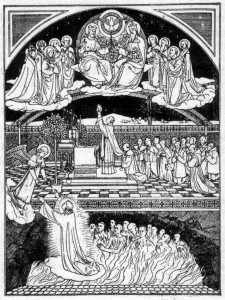 This could be a model for other dioceses.
This could be a model for other dioceses.
Below is a decree from Most Reverend Donald J. Hying, of the Diocese of Madison, by which he grants that people within the Diocese of Madison can gain plenary indulgences without confession and Communion, provided they have contrition for their sins and have the intention of receiving these sacraments as soon as possible.
This is possible under Enchiridion Indulgentiarum 25.
Under normal conditions, to gain a plenary indulgence, you do the prescribed work and also make a good sacramental confession, receive Eucharistic Communion, and say prayers for the intentions designated by the Sovereign Pontiff, which must be fulfilled in the several days (20, actually) before or after the indulgenced work is performed with the proper disposition. A proper disposition means, for a plenary indulgence, being in the state of grace and having no attachment to sins, even venial. Yes, that is possible. The decree, below, might have made that “freedom from attachment even to venial sins” a little more explicit, but it is nevertheless implicit in the phrase “provided they have contrition for their sins”.
Have a look.
| Decree granting permission to obtain indulgences outside of the usual conditions |  |
| Bishop Hying’s Letter |
| Thursday, Mar. 26, 2020 — 12:00 AM |
| Protocol #: 015-2020
Whereas, during this time of disease, it has been necessary to take such drastic measures as the cancellation of all public celebrations of the Holy Mass in order to protect the public health by slowing the spread of contagion; Whereas these measures, though necessary, have the unfortunate effect of making it temporarily impossible for most of the faithful to receive sacramentally the graces of Holy Communion, and difficult for them to receive the graces imparted in the celebration of the other sacraments; Whereas it is therefore all the more essential for the faithful in these times to avail themselves of the extra-sacramental graces given abundantly by God through his Holy Church, especially the grace of the partial or total remission of the temporal punishment owed to sin, which the Church concedes to the faithful who partake in specific works to which the Church, custodian of the great treasury of the merits of Christ and the saints, attaches an indulgence; Whereas, however, the protective measures mentioned above constitute an obstacle to the perfect fulfilment of the usual conditions which the Church, by the power of loosing and binding entrusted to her by Christ, requires for the reception of indulgences, namely, sacramental confession, Eucharistic Communion, and prayer for the intention of the Sovereign Pontiff, which must be fulfilled in the several days before or after the indulgenced work is performed with the proper disposition; Therefore, by virtue of the faculty granted to local ordinaries in n. 25 of the Manual of Indulgences, I hereby grant permission for all the faithful of the Diocese of Madison wherever they are, as well as anyone actually present within the diocese, to gain plenary indulgences without confession and Communion, provided they have contrition for their sins and have the intention of receiving these sacraments as soon as possible; Nevertheless, I urge the faithful who take advantage of this permission to make a Spiritual Communion soon before or after performing an indulgenced work, without prejudice to the requirement of receiving sacramental Communion as soon as it becomes possible, And I exhort all the faithful to obtain indulgences, particularly by partaking in indulgenced works that are especially suited not only to this penitential season of Lent but also to these difficult times, among which I make special mention of the following: • The devout recitation of the rosary, including in a family setting (#17 in the Manual of Indulgences), • The reading of sacred scripture for at least half an hour from a text approved by the competent authority (#30), • The pious Way of the Cross celebrated in those churches that remain open, or for those who are impeded from celebrating in a church, reading and meditating on the Passion and Death of Our Lord Jesus Christ for at least a quarter of an hour (#13), • Devout reception of the Papal Blessing, which I will impart via broadcast after the celebration of Mass on Wednesday, March 25, the Solemnity of the Annunciation (#4); I remind the faithful that, although Mass cannot currently be publicly celebrated, Churches are generally open to the public for prayer and devotions, as well as sacramental confessions when possible, provided that no large groups accumulate and appropriate protective and hygienic measures are always taken, Lastly, I inform or remind the faithful of the indulgences conceded today by the Apostolic Penitentiary, which include indulgences for the faithful suffering from the Coronavirus, health care workers, and the dying. Given at Madison this 20th day of March, in the year of our Lord 2020.
+Donald J. Hying William D. Yallaly |































I wish the Pope would issue a decree like this and make it universal.
”The reading of sacred scripture for at least half an hour from a text approved by the competent authority (#30),”
I was just wondering what or who exactly is the “competent authority” for the approval of a text from scripture? Does it refer to the readings of the lectionary? Or is there some specially approved Scripture passages that are meant to be read around this special time that have been approved by the Bishop or the relevant Vatican authority?
He did! Already over a week ago:
https://press.vatican.va/content/salastampa/en/bollettino/pubblico/2020/03/20/200320c.html
Am sure that ‘text approved by competent authority’ means the use of a version of the Scriptures that has the imprimatur, nothing more than that– although someone may well know better than I do.
Pingback: MONDAY EDITION – Big Pulpit